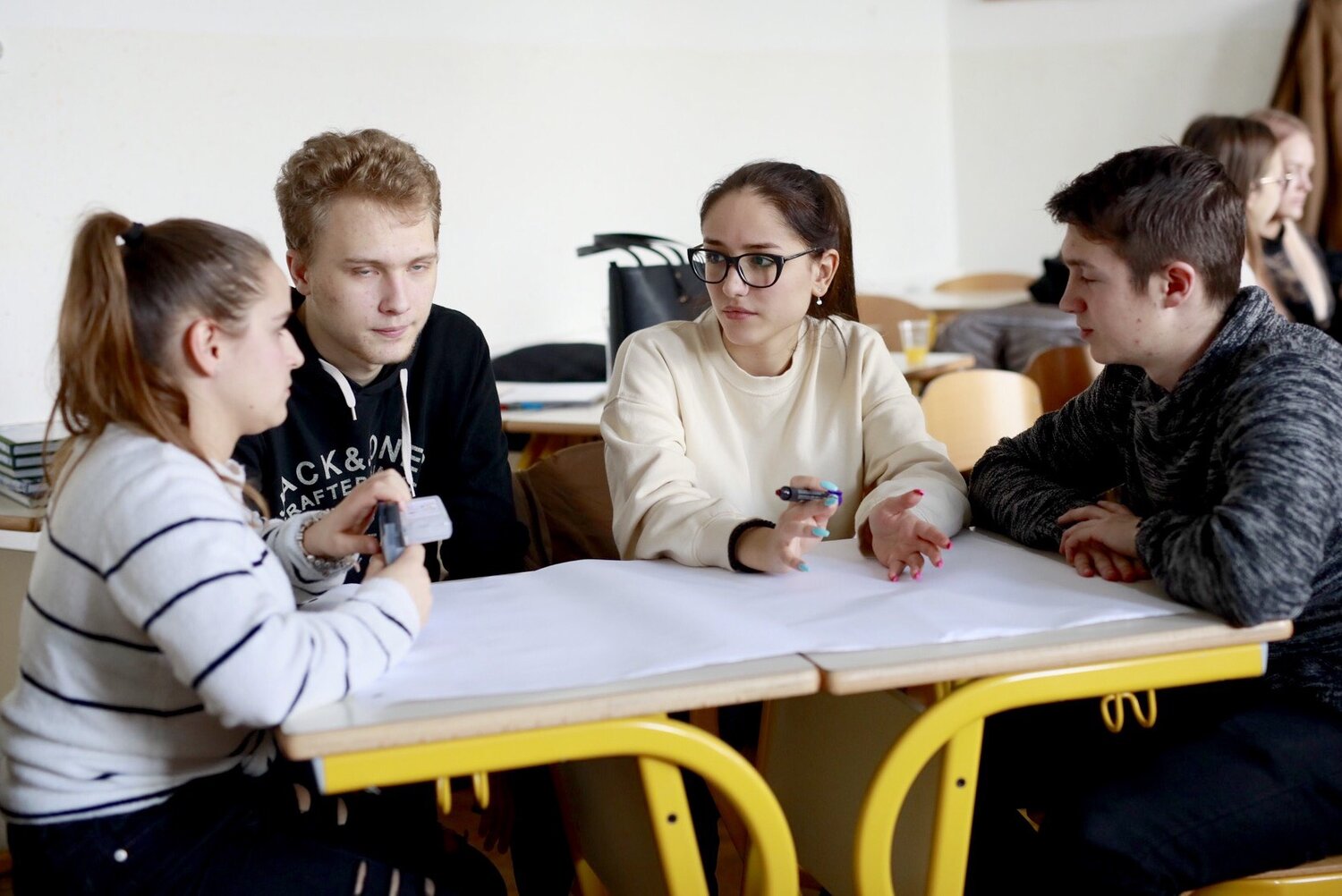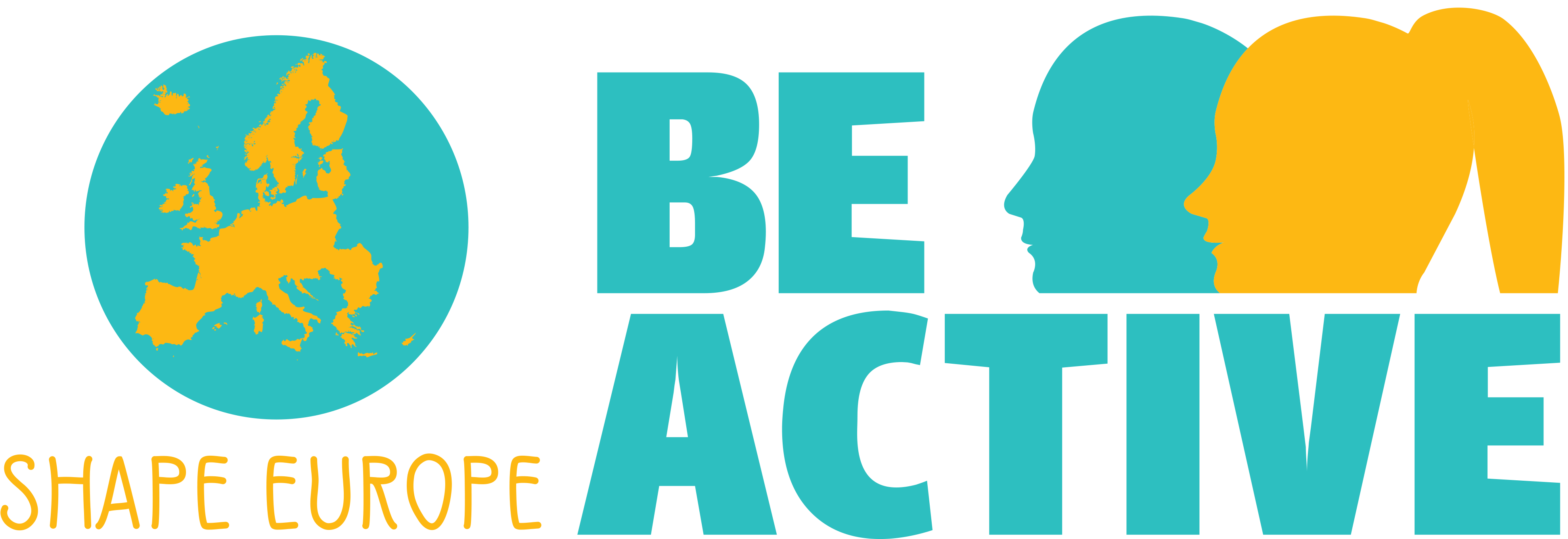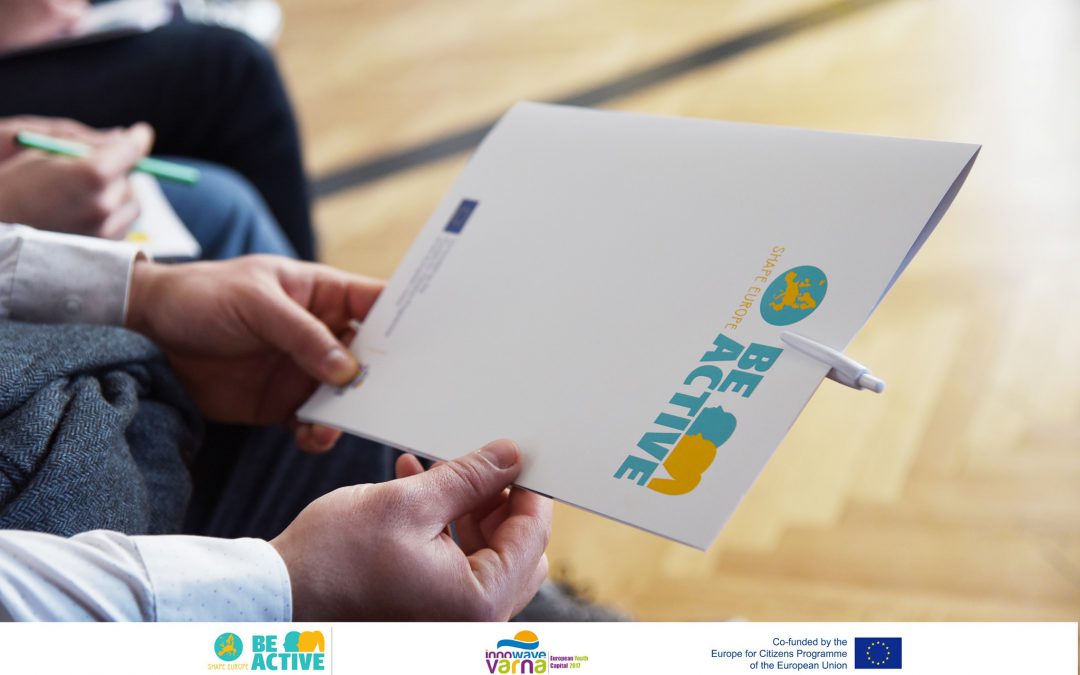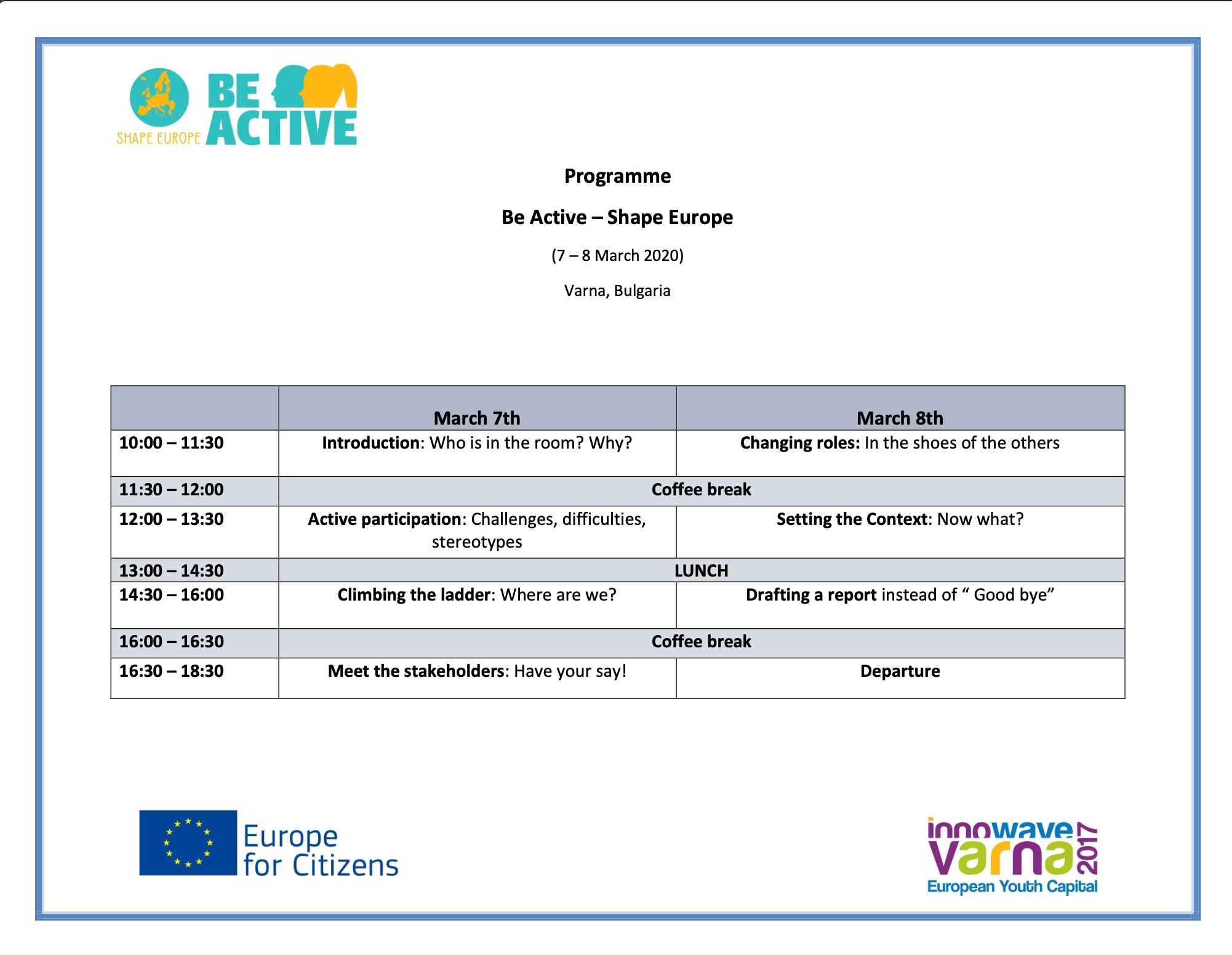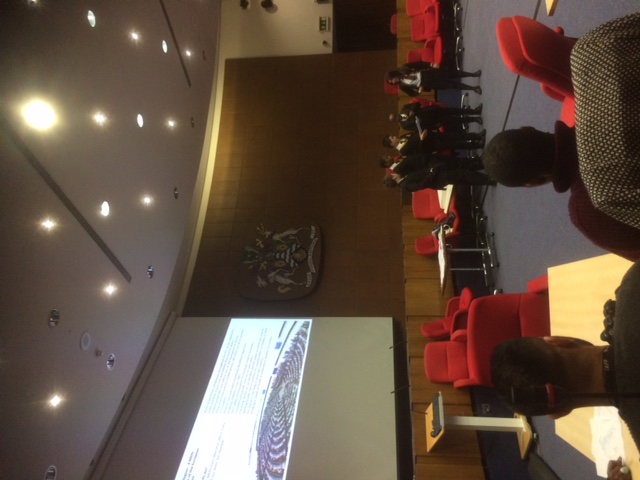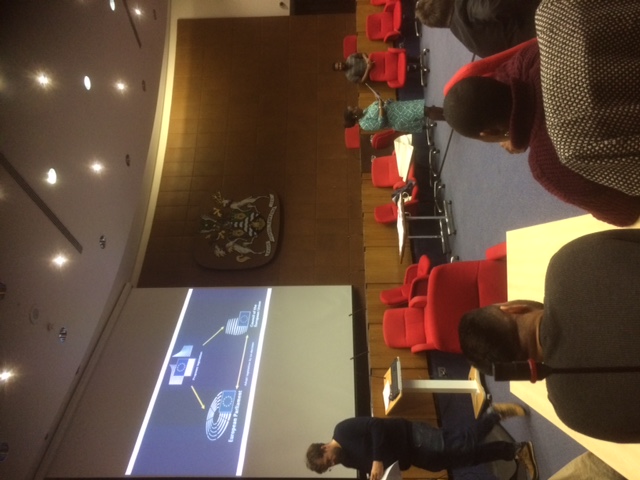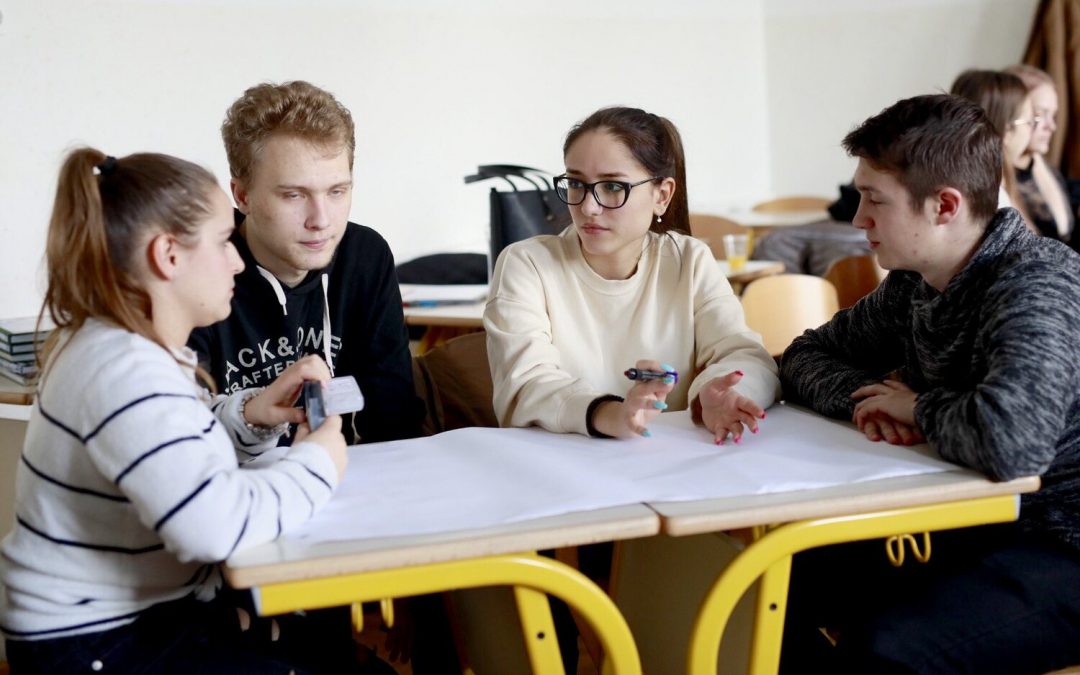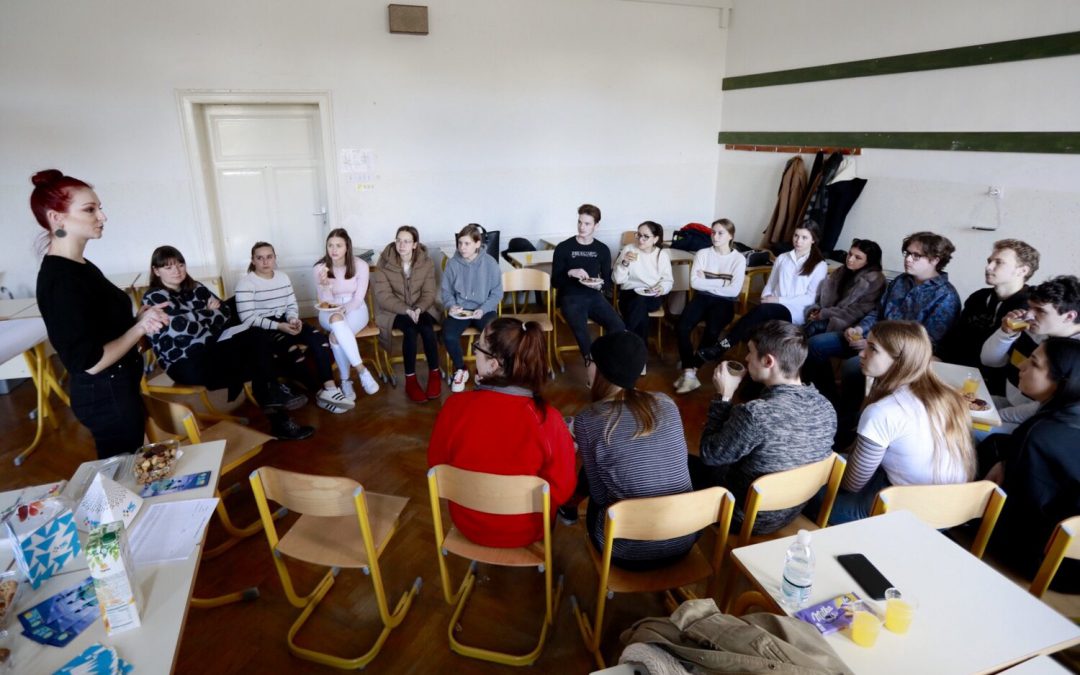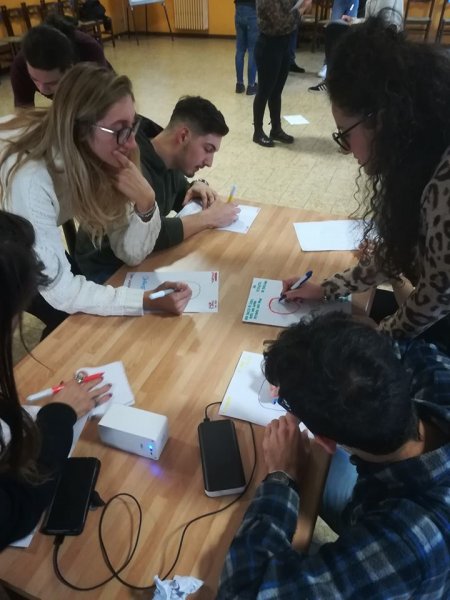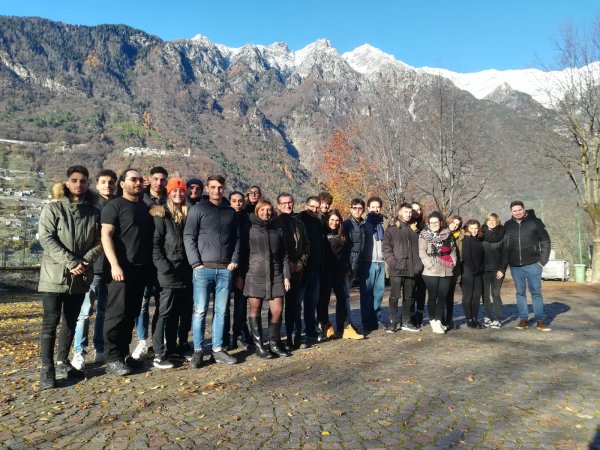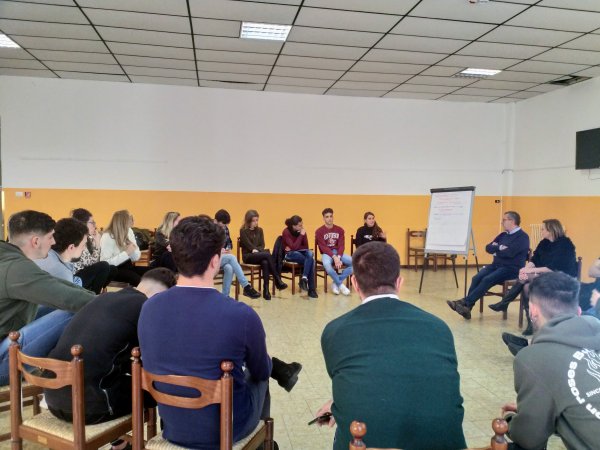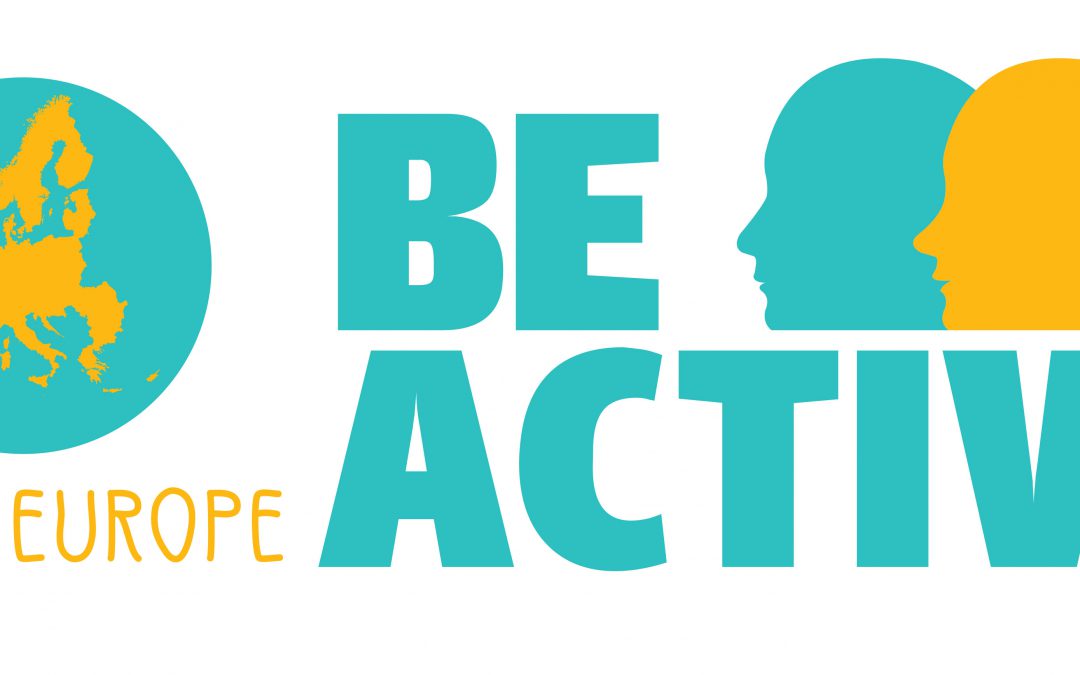Esta sessão abordou a “Democracia Participativa”, um dos temas discutidos no diálogo estruturado de 11 de julho de 2019, e que os jovens decidiram aprofundar neste workshop.
A sessão contou com a participação de jovens de Santa Maria da Feira, jovens ex-membros do organismo de cidadania ativa ‘Assembleia de Crianças’, jovens ex-membros do organismo de cidadania participativa ‘Jovem Autarca’, jovens estrangeiros inscritos no Corpo Europeu de Solidariedade do nosso Concelho, convidados internacionais adultos (amigos de longa data de Lewisham, Reino Unido e Alingsas, Suécia), técnicos e legisladores de Santa Maria da Feira e Joué-Lès-Tours, França.
O workshop teve início com uma visita e breve apresentação dos serviços da incubadora In Europarque, especialmente dirigida a jovens empresários e a promoção do networking com a comunidade local e regional.
Posteriormente, foram realizadas apresentações e dinâmicas para quebrar o gelo pelos jovens presentes no workshop.
O workshop sobre democracia participativa iniciou-se com a apresentação do vídeo introdutório “O que é democracia” sobre o papel dos cidadãos e formas de intervenção na sociedade.
Dada a diversidade do assunto, os participantes optaram por se dividir em grupos focais sobre subtemas da democracia participativa, tais como:
- Como promover uma cultura de democracia participativa?
- Há democracia participativa na vossa cidade? Como seria a ideal?
- Participação dos cidadãos: sim ou não?
- Quais são os tipos / instrumentos de democracia participativa?
- Que ferramentas (digitais ou outras) deveriam ser usadas para promover a democracia participativa em ambientes urbanos e rurais?
No final, os jovens chegaram às seguintes conclusões:
- A educação é extremamente importante para a promoção e desenvolvimento de uma cultura de democracia participativa. O desenvolvimento da democracia deve basear-se nas necessidades dos cidadãos, e tal só é possível se estes estiverem ativamente envolvidos na vida local e na construção ativa da sociedade sob o lema da igualdade e da justiça. A educação e o envolvimento ativo dos cidadãos permitem-lhes ter consciência dos seus direitos e responsabilidades, incentivando assim a inclusão de todos os grupos sociais. A educação para a democracia participativa deve envolver todos os cidadãos, quer estejam nas escolas (ensinando, passando informações, incentivando a ação), nas organizações da sociedade civil (ensinando e aprendendo com a experiência / ação), nos meios de comunicação (aprendendo, estimulando o pensamento crítico sobre o quê se vê e lê (notícias falsas), nas famílias, nos movimentos políticos, nos partidos, nas universidades. Educar para a democracia participativa com foco na educação não formal na formação, oficinas, encontros e intercâmbios. O programa educacional deve incluir o seguinte: ensinar para a tolerância, ser ativo na sociedade, trabalhar em conjunto, ensinar a respeitar todos os cidadãos, aceitar as diferenças, negociar objetivos comuns, promover o Bem Comum.
- Na minha cidade / país existe democracia representativa ao nível do parlamento nacional, dos governos locais e europeus. Ao nível da democracia participativa existem sindicatos, associações de direitos humanos, grupos religiosos, ONG, organizações de voluntariado, grupos de cidadãos, movimentos de defesa do consumidor. Estas organizações existem para criar mudanças, lutar por uma melhor qualidade de vida, denunciar injustiças, defender direitos e serviços, divulgar direitos humanos, utilizando locais como as ruas, comunidades, áreas metropolitanas, empresas, associações estudantis, conselhos juvenis. A democracia participativa ideal deve ser diversa, representativa, responsável, conhecida e aberta, confiável, transparente, disposta a trazer mudanças, preparada para o conflito, capaz de organizar e planejar. Uma democracia participativa que confia no Quem? e Como?, que representa os cidadãos, e que compartilha informações e possibilita a evolução da democracia.
- A participação do cidadão é extremamente relevante, mas poderia ser melhor. Os jovens são o futuro, e mais jovens deveriam estar cientes do significado da democracia participativa. Achamos que é importante ouvir os mais velhos. Os idosos têm mais experiência de vida e mais conhecimento sobre como a sociedade funciona, pelo que podem desempenhar um papel fundamental na orientação dos jovens para que todos juntos possamos fazer escolhas melhores e mais informadas. Esta ligação intergeracional pode começar em escolas, escritórios de jovens ou associações de jovens. O projeto Jovem Autarca é um bom exemplo.
- Os instrumentos de democracia participativa que existem hoje são o referendo para maiores de 18 anos; a consulta pública online; o voto para cidadãos maiores de 18 anos; conselhos e assembleias, para os cidadãos conscientes da sua existência. Destaca-se o papel das assembleias juvenis que dão voz aos jovens, assim como um projeto do tipo Jovem Autarca. Infelizmente, não há acesso a informação confiável / correta, por isso a educação política é cada vez mais indispensável.
- No que diz respeito às ferramentas de democracia participativa, podemos destacar as associações de estudantes, a internet, conselhos de jovens, conselhos de seniores e conselhos de bairro. A ênfase deve ser colocada na formação dos jovens em atividades relacionadas com a vida política, bem como na divulgação de estruturas que estimulem a luta pela democracia. Provavelmente nem todos os cidadãos têm o mesmo acesso às ferramentas da democracia, seja porque vivem em áreas rurais, ou porque não dominam a Internet ou porque têm dificuldade em decifrar os conteúdos veiculados pelos meios de comunicação.
O dia terminou com um jantar animado com a presença do Presidente da Câmara de Santa Maria da Feira, Emídio Sousa, que ouviu dos jovens presentes as conclusões do workshop. De uma forma geral estes destacaram a importância da educação para a democracia, as dinâmicas de cidadania intergeracional, bem como os tipos e ferramentas da democracia participativa hoje.
On November 26, 2019 the second moment of the Be Active – Shape Europe project, the National Workshop, took place at the In Europarque incubator, in Santa Maria da Feira, from 5.30pm to 7.30pm, involving 29 participants.
This session covered “Participatory Democracy”, one of the topics discussed in the structured dialogue of 11 July 2019, and which the young people decided to further explore in this workshop.
The session involved young people from Santa Maria da Feira, young ex-members of the active citizenship body ‘Assembleia de Crianças’, young ex-members of the participatory citizenship body ‘Jovem Autarca’, young foreigners undergoing the European Solidarity Corps in our Municipality, adult international guests (long-time friends from Lewisham, UK and Alingsas, Sweden), technicians, and policy makers from Santa Maria da Feira and Joué-Lès-Tours, France.
The workshop began with a visit and brief presentation of the In Europarque incubator services, especially aimed at young entrepreneurs and the promotion of networking with the local and regional community.
Subsequently, presentation and icebreaking dynamics were carried out by the young people present at the workshop.
The workshop on participatory democracy began with the presentation of the introductory video “What is democracy” on the role of citizens and forms of intervention in society.
Given the diversity of the subject, participants chose to split into focus groups on participatory democracy subthemes, such as:
- How to promote a culture of participatory democracy?
- Participatory democracy existing in your city? What will be the ideal one?
- Citizens’ participation: yes or no?
- What are the types /instruments of participatory democracy?
- What tools (digital or others) should be used to promote participatory democracy in urban and rural environments?
At the end, the young people reached the following conclusions:
- Education is extremely important for promoting and developing a culture of participatory democracy. The development of democracy must be based on the needs of citizens, and this is only possible if they are actively involved in local life and the active construction of society under the motto of equality and justice. The education and active involvement of citizens allows them to be aware of their rights and responsibilities, and thus encourages the inclusion of all social groups. Education for participatory democracy should involve all citizens, whether they are in schools (teaching, passing on information, encouraging action), in civil society organizations (teaching and learning from experience / action), in the media (learning, stimulating critical thinking about what one sees and reads (fake news), in families, in political movements, in parties, in universities. Educating for participatory democracy by focusing on non-formal education in training, workshops, meetings and exchanges. The educational program should include the following: teaching for tolerance, being active in society, working together, teaching to respect all citizens, accepting differences, negotiating common goals, promoting the Common Good.
- In my city / country there is representative democracy at the level of the national parliament, local and European governments. At the level of participatory democracy there are trade unions, human rights associations, religious groups, NGOs, volunteering organizations, citizens’ groups, consumer protection movements. These organizations exist to create change, fight for a better quality of life, denounce injustice, defend rights and services, publicize human rights, using places such as the streets, communities, metropolitan areas, businesses, student associations, youth councils. The ideal participatory democracy should be diverse, representative, accountable, well-known and open, reliable, transparent, willing to bring about change, prepared for conflict, capable of organizing and planning. A participatory democracy that is confident in the Who? and How?, that represents the citizens, and that shares information and enables the evolution of democracy.
- Citizen participation is extremely relevant but could be better. Young people are the future, and more young people should be aware of the meaning of participatory democracy. We think it is important to listen to our elders. Older people have more life experience and more knowledge about how society works, thus they can play a key role in mentoring young people so that all together we can make better and more informed choices. This intergenerational link can start in schools or youth offices or youth associations. The Jovem Autarca project is a good example.
- The instruments of participatory democracy that exist today are the referendum for those over 18; the online public consultation; voting for citizens over 18 years old; councils and assemblies for citizens aware of their existence. The role of youth assemblies that give youth a voice should be highlighted, as well as a project of the Young Mayor type. Unfortunately, there is no access to reliable / correct information, so political education is increasingly indispensable.
- Regarding participatory democracy tools we can highlight student associations, the internet, youth councils, senior councils, neighbourhood / neighbourhood councils. Emphasis should be placed on educating young people with activities related to political life, as well as making known structures that stimulate the struggle for democracy. Most likely not all citizens have the same access to the tools of democracy, either because they live in rural areas, or because they do not master the Internet or because they find it hard to decipher the content disseminated by the media.
The day ended with cheerful dinner with the presence of the Mayor of Santa Maria da Feira, Emídio Sousa, who heard the conclusions of the workshop from the young people present, who generally highlighted the importance of education for democracy, the dynamics of intergenerational citizenship, as well as the types and tools of participatory democracy today.
